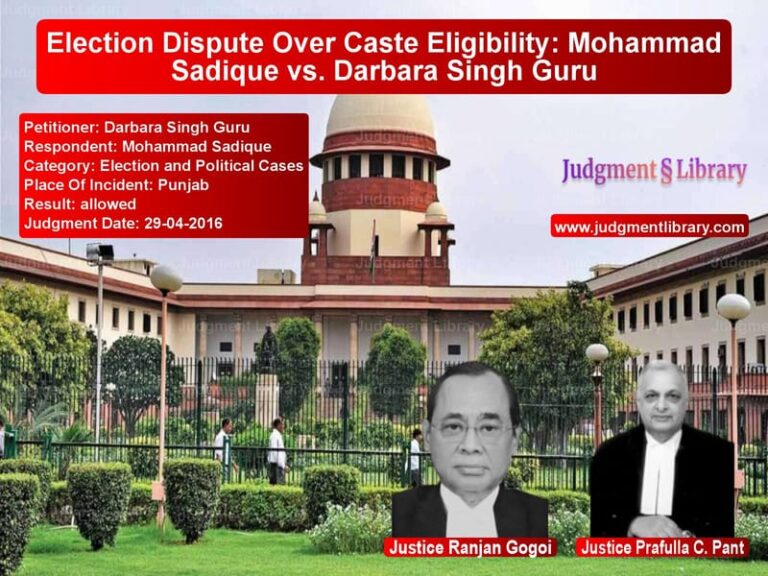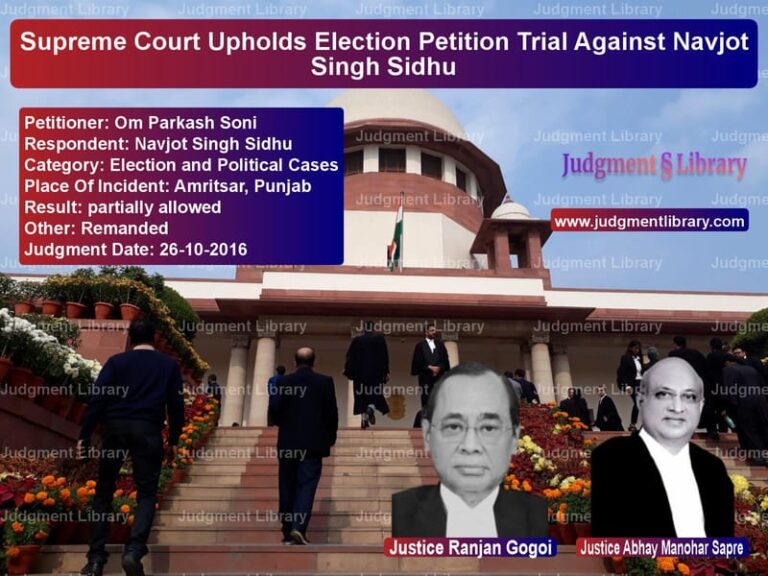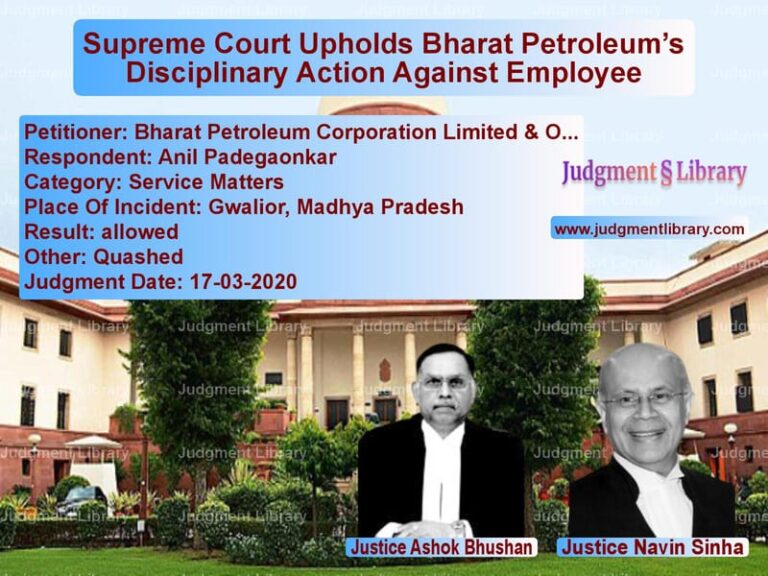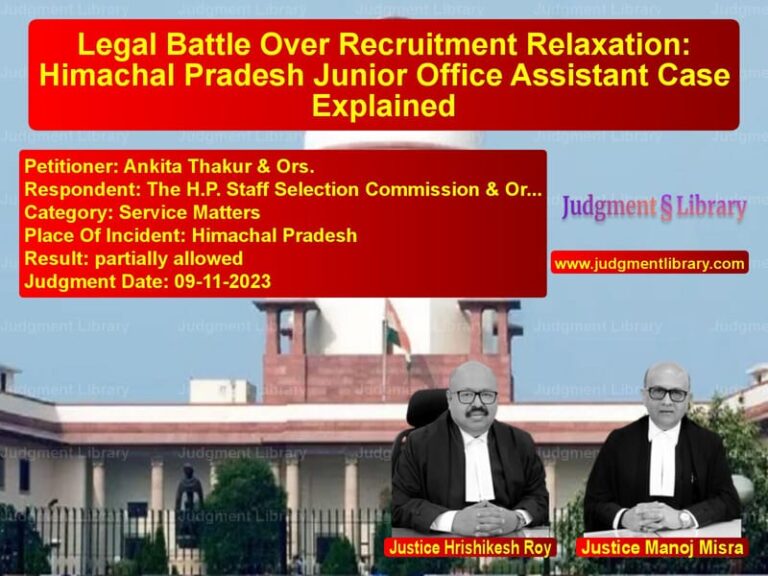Supreme Court Strikes Down Kerala Ordinance on Medical College Admissions
The case of Medical Council of India v. State of Kerala & Ors. revolved around the legality of the Kerala Professional Colleges (Regularisation of Admission in Medical Colleges) Ordinance, 2017. The Supreme Court was called upon to determine whether the State of Kerala had the authority to nullify previous judicial decisions regarding illegal medical college admissions by promulgating this ordinance.
Background of the Case
In 2016-17, 180 students were illegally admitted to the MBBS program at Kannur Medical College and Karuna Medical College, operated by Prestige Educational Trust and Safe Development Alms Trust, respectively. The Admission Supervisory Committee (ASC) of Kerala found that these admissions violated norms set forth by the Supreme Court in Sankalp Charitable Trust v. Union of India, which mandated that all medical admissions must be conducted through the National Eligibility-cum-Entrance Test (NEET) and centralized counseling.
The Kerala High Court and the Supreme Court upheld the findings of the ASC, leading to the cancellation of these admissions. However, in an attempt to bypass these judicial rulings, the Kerala government promulgated the Kerala Professional Colleges (Regularisation of Admission in Medical Colleges) Ordinance, 2017, to regularize the admissions.
Legal Issues Raised
- Whether the Kerala government had the legislative competence to promulgate an ordinance nullifying judicial decisions.
- Whether the ordinance violated the principle of separation of powers by encroaching upon judicial functions.
- Whether the ordinance was constitutionally valid in light of previous Supreme Court judgments affirming the cancellation of these admissions.
Arguments by the Medical Council of India
The Medical Council of India (MCI), the petitioner, argued that:
- The ordinance directly nullified judicial rulings, which is unconstitutional.
- The Kerala government had no power to regularize admissions that had been deemed illegal by both the High Court and the Supreme Court.
- The ordinance was a clear case of executive overreach and violated the doctrine of separation of powers.
- The Supreme Court had already ruled that these admissions were illegal and should not be regularized under any circumstances.
Arguments by the State of Kerala
The State of Kerala and the affected students argued that:
- The ordinance did not overturn judicial rulings but merely sought to provide relief to students who were not at fault.
- The affected students had qualified under NEET and should not be penalized for the management’s mistakes.
- The state had the authority to pass legislation to address issues of public concern.
- The ordinance did not interfere with judicial power but rather provided a framework for evaluating the students’ eligibility.
Supreme Court’s Observations
The Supreme Court categorically struck down the ordinance, holding that it was an unconstitutional attempt to nullify judicial decisions. The Court stated:
“What has been done by the impugned Ordinance by the State Government is clearly entrenching upon the field of judicial review, and it was obviously a misadventure resorted to. It was not at all permissible for the State Government to promulgate the Ordinance/legislate in the matter.”
The Court further emphasized that the ordinance violated the doctrine of separation of powers, stating:
“The legislature cannot declare any decision of a court of law to be void or of no effect. It can, however, pass an amending Act to remedy defects pointed out by a court of law. In other words, a court’s decision must always bind unless the conditions on which it is based are so fundamentally altered that the decision could not have been given in the altered circumstances.”
Final Judgment
The Supreme Court held:
- The Kerala government’s ordinance was unconstitutional as it nullified judicial orders.
- The doctrine of separation of powers was violated by the state’s attempt to override court decisions.
- The admissions had already been declared illegal, and no law could retrospectively validate them.
- The ordinance was quashed, and the earlier judicial rulings remained binding.
Conclusion
The Supreme Court’s ruling reaffirmed the principles of judicial independence and the rule of law. By striking down the Kerala government’s ordinance, the Court ensured that executive overreach could not be used to bypass judicial decisions. The judgment serves as a strong precedent against attempts by state governments to use legislation to undo binding court orders, reinforcing the fundamental doctrine of separation of powers.
Petitioner Name: Medical Council of India.Respondent Name: State of Kerala & Ors..Judgment By: Justice Arun Mishra, Justice Indira Banerjee.Place Of Incident: Kerala.Judgment Date: 12-09-2018.
Don’t miss out on the full details! Download the complete judgment in PDF format below and gain valuable insights instantly!
Download Judgment: Medical Council of I vs State of Kerala & Or Supreme Court of India Judgment Dated 12-09-2018.pdf
Direct Downlaod Judgment: Direct downlaod this Judgment
See all petitions in Constitution Interpretation
See all petitions in Fundamental Rights
See all petitions in Public Interest Litigation
See all petitions in Judgment by Arun Mishra
See all petitions in Judgment by Indira Banerjee
See all petitions in allowed
See all petitions in Quashed
See all petitions in supreme court of India judgments September 2018
See all petitions in 2018 judgments
See all posts in Constitutional Cases Category
See all allowed petitions in Constitutional Cases Category
See all Dismissed petitions in Constitutional Cases Category
See all partially allowed petitions in Constitutional Cases Category







